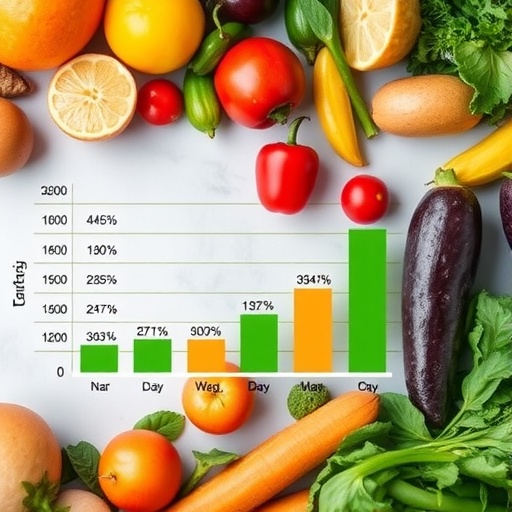In a groundbreaking study titled “Biodiversity pressure from fruit and vegetable consumption in the United Kingdom, India, and South Africa varies by product and growing location,” researchers have embarked on an exploration that sheds light on the intricate relationship between our dietary choices and the state of global biodiversity. The consumption of fruits and vegetables—the staples of healthful diets—also carries ecological impacts that are often overlooked. The research, published in the esteemed journal Nature Food, provides crucial insights that could fundamentally alter how consumers, policymakers, and businesses perceive the environmental consequences of agricultural practices.
As the world becomes increasingly urbanized and dietary patterns shift towards plant-based diets, understanding the environmental ramifications of agricultural choices has never been more urgent. The study undertakes a comparative analysis of fruit and vegetable consumption across three diverse regions: the United Kingdom, India, and South Africa. Each region presents unique agricultural practices, socioeconomic factors, and environmental conditions, making this cross-comparative approach indispensable.
The researchers employed a comprehensive methodology, incorporating life cycle assessments (LCAs) to scrutinize the environmental impact of various products sourced from distinct growing locations. Life cycle assessments provide a holistic view by evaluating the ecological footprint from cultivation to consumption. This meticulous approach reveals how even seemingly ordinary choices, like the type of salad consumed, can possess far-reaching implications for biodiversity.
One of the study’s striking findings highlights a notable variance in biodiversity pressure for specific fruits and vegetables based on their origin. For instance, products grown in monoculture systems often result in significant habitat destruction and decreased species diversity, whereas those cultivated in more biodiverse systems exhibit a considerably lower environmental impact. The researchers emphasize the importance of sourcing produce that supports agroecological practices, thereby reaffirming the role of consumers in driving change through informed purchasing decisions.
Furthermore, the research underscores the intertwined fate of nutrition and biodiversity conservation. As global demand for fruit and vegetable consumption rises, the pressure on ecosystems intensifies. The study points out that certain high-demand products, particularly exotic fruits, often lead to unsustainable agricultural practices in their native growing regions. This not only threatens local biodiversity but also jeopardizes the long-term availability of these foods for consumers worldwide.
Despite the alarming trends, the researchers remain optimistic, advocating for greater awareness and education around sustainable consumption. By fostering a deeper understanding among consumers about the origins of their food, they can make choices that contribute positively to both their health and the planet’s ecology. The ripple effect of collective consumer behavior could encourage producers to adopt more sustainable farming methods and prioritize biodiversity in their practices.
The study also investigates the role of government policies in mitigating biodiversity loss linked to agricultural practices. Regulatory frameworks and incentives can significantly influence farming techniques and consumer choices. Policymakers are urged to promote biodiversity-centric agricultural policies that not only meet the nutritional needs of populations but also prioritize the preservation of ecosystems.
Moreover, innovations in agricultural technology can serve as a pivotal ally in this endeavor. The ongoing development of precision agriculture, organic farming techniques, and agroforestry practices presents an opportunity to minimize biodiversity loss while meeting consumer demands. The study advocates for investments in research and development that prioritize sustainable food systems while maintaining productivity.
In a world grappling with climate change and environmental degradation, the interconnectedness of food systems and biodiversity is clearer than ever. This research serves as a clarion call for individuals, communities, and nations to reevaluate their dietary choices and consider their broader ecological implications. Our appetites, it appears, can either contribute to or combat biodiversity loss, making the awareness of this connection vital.
Encouragingly, as more consumers become educated about the origins and impacts of their food choices, there is a burgeoning movement toward sustainable consumption. Local food initiatives, support for organic farmers, and advocacy for fair trade products are gaining traction. This shift not only aids in biodiversity conservation but also strengthens local economies and fosters sustainable agricultural practices.
In conclusion, the study illuminates a pathway toward more conscientious consumption and sustainable food systems. By examining the influences of consumption patterns on biodiversity across different regions, the researchers provide invaluable insights that can help steer global efforts toward a more sustainable future. As consumers, we hold the power to shape agricultural practices and influence biodiversity through our choices. The question now remains: will we seize that opportunity?
This pivotal research not only contributes to the body of knowledge surrounding agriculture’s impact on biodiversity but also empowers individuals to take action. With the consequences of our food choices laid bare, the message is clear: in the quest for sustainability, every bite counts.
Subject of Research: The impact of fruit and vegetable consumption on biodiversity in various regions.
Article Title: Biodiversity pressure from fruit and vegetable consumption in the United Kingdom, India and South Africa varies by product and growing location.
Article References:
Chapman, A.S.A., Green, R., Hadida, G. et al. Biodiversity pressure from fruit and vegetable consumption in the United Kingdom, India and South Africa varies by product and growing location. Nat Food 6, 892–905 (2025). https://doi.org/10.1038/s43016-025-01222-y
Image Credits: AI Generated
DOI: https://doi.org/10.1038/s43016-025-01222-y
Keywords: biodiversity, agriculture, sustainable consumption, food systems, life cycle assessment, environmental impact.




